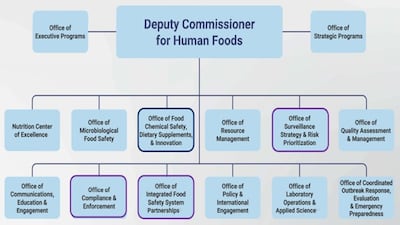
Policy & Regulation
An FDA “expert roundtable” on talc produced a new talking point on a potential drug safety risk, but the basis of that claim is difficult to determine.
Based on advice from its advisory committees, the UK's Food Standards Agency is encouraging businesses to meet an acceptable daily intake of 10mg CBD per day and a safe upper limit of 0.07mg THC per day.
The agency says items on its Human Foods Program’s proposed agenda for guidance “to complete during 2025” include identity and safety information for NDI notifications. Its announcement also links to document about a separate key industry question, a rulemaking which would recognize NAC as a lawful
FTC decision, says Bureau of Competition director Daniel Guarnera, influenced by both companies marketing different lines in different countries, limiting the number of similar products in the same categories the combined firm would offer.
Dietary Supplement Caucus e-launched the 119th Congress with Utah Republican House member Mike Kennedy and Texas Democrat member Marc Veasey as co-chairs and with a total of nine senators and 20 House members spanning both parties.
Modifications to forms FDA 3500, for voluntary reporting by healthcare professionals, and 3500A, for mandatory reporting by manufacturers, marketers or facilities, include limiting changing gender question to sex and asking for only male or female answer.
Prominent trade groups call on the European Commission to improve risk assessment of innovative food products by making changes to processes at the European Food Safety Authority.
Along with two instructional videos, FDA provides fact sheet detailing common problems with NDINs while supplement industry awaits guidance on two hurdles for clearing the NDIN process, providing identity information and evidence of safety for ingredients.
Provisions in bill approved by Agriculture, Rural Development, FDA and Related Agencies Subcommittee aren’t likely to pass largely because they set a price too high for delta-8 THC and other ingredients to meet the definition of hemp as a de-scheduled substance.
Limited capacity and a two-to-three year timescale for reformulation could mean that many VMS supplements disappear from the market, warns EPPA partner Alexandra Bocquillion, speaking at the AESGP Annual Meeting in Warsaw, Poland.
The White House requested $6.8bn for the FDA, down 3.9% from the current funding level, but does not propose any legislative changes. In previous years, the agency used the budget process to seek statutory fixes specific to generic drugs and shortages.
A US House bill would give the FDA $33.1m more in budget authority than requested by the Trump Administration for fiscal year 2026. The measure was sent to the full House Appropriations committee on a party-line vote.
Results of survey found a majority of representative sample of US voters nationwide agree “current regulations should be updated and strengthened to protect consumers,” CHPA says.
Discussion of the administration’s “Make America Healthy Again” campaign at a recent regulatory conference provided a platform for questions about what HHS Secretary Kennedy wants and how he expects to get there.
Some changes the administration has proposed are a “great example of regulating by press release,” says Duffy MacKay, CHPA’s dietary supplements chief. But “after 30 years, the Dietary Supplement Health and Education Act could be modernized to serve the consumer better.”
Result of firms marketing weight loss products to Black and Latino girls and to lower-income households is to “worsen health inequities by gender, race, ethnicity and income,” says Harvard researcher Bryn Austin, director of Strategic Training Initiative for the Prevention of Eating Disorders.
“We've made some progress and really hope to see some movement as we move forward this year,” says FDA Office of Dietary Supplement Programs director Cara Welch.
Same-day announcements of RFIs from HHS secretary cover nutrient review process for infant formula and Kennedy’s “10-to-1 deregulatory policy” as part of president’s “broader federal effort to reduce regulatory burdens and increase transparency.”
Germany’s Federal Institute for Risk Assessment says that there is "no evidence that people with androgenetic alopecia have special dietary needs or a special nutrient requirement.”
After National Advertising Division attorneys, in a review prompted by a challenge by Band-Aid line marketer Kenvue, recommended ASO LLV cease use of its “up to 2x faster healing” claim, they determined the firm had not fully complied.


















